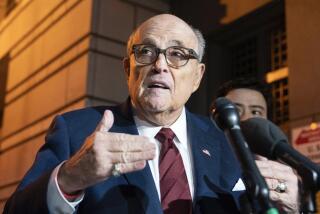Tribune bankruptcy Q & A
- Share via
After 27 months of legal wrangling, Tribune Co. and its creditors are headed into what could be the deciding chapter of the company’s tangled bankruptcy saga.
Starting Monday, U.S. Bankruptcy Judge Kevin Carey in Delaware will hear evidence from a multitude of lawyers arguing for and against two competing visions of how to restructure the Chicago-based media conglomerate. Such sessions are called confirmation hearings.
Tribune owns the Los Angeles Times, the Chicago Tribune, KTLA-TV Channel 5 and other media properties.
Here are some questions and answers to explain where the case stands:
What are confirmation hearings?
Confirmation hearings in a bankruptcy case are the judge’s opportunity to sign off on a plan of reorganization negotiated between the company and its creditors. Typically, there is a single plan. The Tribune case features two competing plans proposed by two highly litigious groups. Most observers expect a shootout as each group’s lawyers try to convince Carey that its plan provides the fairest result for the parties most harmed by the company’s financial collapse.
Who are the two groups?
Tribune and the Official Committee of Unsecured Creditors in the case have joined with hedge funds and senior debt holders Oaktree Capital Management and Angelo, Gordon & Co. to propose one plan.
They are opposed by Aurelius Capital Management, a hedge fund that owns much of Tribune’s junior debt and has organized a coalition of investors to try to get more from the senior group.
What will be decided, and when?
Based on the evidence offered during the confirmation hearings, Carey will rule on which plan serves the greater good. He has allotted two weeks for the arguments between the plan proponents, and he probably will need several more days to consider objections to the plans from other parties, such as the U.S. Justice Department or state tax authorities. It may take another month for him to collect post-trial briefs, attorneys say.
Why is the case taking so long?
Many experts say the Tribune case has become Exhibit A for concerns that the bankruptcy process can get gridlocked by hedge funds and other investors that buy corporate debt for pennies on the dollar after a company files for Chapter 11 protection and then try to extract a profit via aggressive legal tactics.
Warring factions of creditors/investors are seeking to capitalize on legal disputes stemming from the company’s 2007 leveraged buyout, which was led by Chicago financier Sam Zell. Those legal disputes — which pit a group of junior creditors, led by Aurelius, against company management, Zell and holders of the debt used to finance the buyout — are very complex. They gained steam last year when a court-appointed examiner said that part of the buyout transaction probably was responsible for making the company insolvent.
Is there still hope that the two sides could settle?
A breakthrough settlement could be forged in the crucible of the confirmation hearings, as Carey signals his leanings one way or the other and the opponents weigh their chances. That could mean an entirely new plan or adjusting one of the existing two.
When might Tribune emerge from bankruptcy?
That depends on when Carey arrives at a decision. Once that happens, it will take several months to implement the winning plan. If Aurelius loses, however, that may not be the end of it. The fund has appealed decisions that didn’t go its way in the past, and many observers expect it would do so in this case.
More to Read
Inside the business of entertainment
The Wide Shot brings you news, analysis and insights on everything from streaming wars to production — and what it all means for the future.
You may occasionally receive promotional content from the Los Angeles Times.









